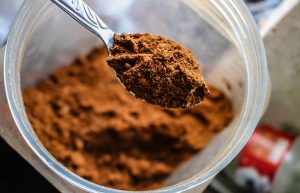 At Habitat Health and Fitness in Lakeland, Florida, FL, we focus on fitness through exercise, but that doesn’t mean we discount other lifestyle changes that can make you healthier. Eating healthy should be a top priority. Some people question whether protein supplements should be used on that quest toward a healthier body. As with most things related to fitness, it all depends on you and your needs. Protein supplements can be quite beneficial for some and unnecessary or even dangerous for others. Older people who may have a difficult time of eating and don’t process protein as efficiently, may benefit from a supplement.
At Habitat Health and Fitness in Lakeland, Florida, FL, we focus on fitness through exercise, but that doesn’t mean we discount other lifestyle changes that can make you healthier. Eating healthy should be a top priority. Some people question whether protein supplements should be used on that quest toward a healthier body. As with most things related to fitness, it all depends on you and your needs. Protein supplements can be quite beneficial for some and unnecessary or even dangerous for others. Older people who may have a difficult time of eating and don’t process protein as efficiently, may benefit from a supplement.
Taking a supplement doesn’t replace healthy eating.
One of the biggest mistakes I’ve seen is people that take a fistful of supplements in the morning and wash them down with a protein supplement as a breakfast or lunch. That’s the wrong way to use supplements. There are phtonutrients in plants that you can’t get in a supplement. Real food has the right balance of nutrients to work in synergy for a healthier body, plus you get the satisfaction of eating, which is one of life’s pleasures.
Not everyone needs a protein supplement.
There are a lot of things that determine the amount of protein you need. If you’re working hard to build muscles, your protein requirement increases. That doesn’t mean you have to get all your protein from supplements, they’re called supplements for a reason. People who have tough workout schedules and seniors are not the only people that may need more protein. Your weight and sex also determines the amount of protein you need.
You should do your homework before choosing a protein supplement.
While some protein supplements may contain other healthy ingredients, such as vitamins and minerals, they may also contain some not so healthy ones. If you’ve ever tasted protein powder with no additives, you know it doesn’t taste good. That’s why some manufacturers add ingredients to make it more palatable, like sugar or thickeners to give a better consistency. Some supplements even have chemicals to extend their shelf life. Protein supplements aren’t regulated by the FDA, so private organizations that test them sometimes find everything from rat feces to metal shavings in them.
- If you’re in a rush and don’t have time for a meal, adding fruits and vegetables to a protein shake can fill the gap, but shouldn’t be used on a regular basis.
- If you opt for a protein bar, read the ingredients first. Many of these types of supplements are more like candy bars than healthy options. If you find a good supplement, use it only as a supplement and don’t over use it. Remember it has extra calories, too.
- You can get too much protein. It can lead to seizures, blood vessel disorders, liver disease, kidney failure and cardiovascular disease. Protein deficiency is very rare in developed nations.
- Check the label of the supplement for a third party endorsement or seal. For example, Clean Label Project tests for contamination and tests for truth in labeling.
For more information, contact us today at Habitat Health & Fitness
